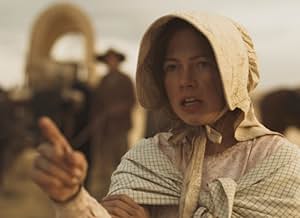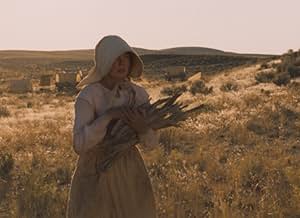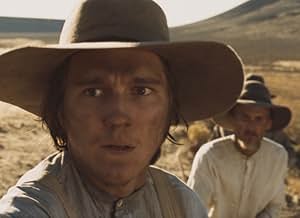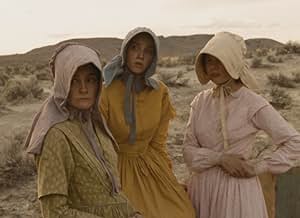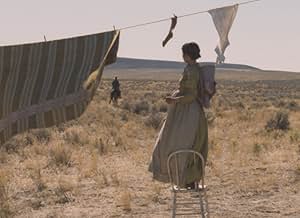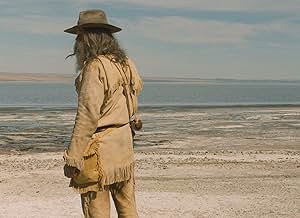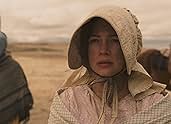CALIFICACIÓN DE IMDb
6.5/10
16 k
TU CALIFICACIÓN
Unos colonos que viajan a través del desierto de Oregón en 1845 se encuentran perdidos en pésimas condiciones.Unos colonos que viajan a través del desierto de Oregón en 1845 se encuentran perdidos en pésimas condiciones.Unos colonos que viajan a través del desierto de Oregón en 1845 se encuentran perdidos en pésimas condiciones.
- Premios
- 7 premios ganados y 14 nominaciones en total
- Dirección
- Guionista
- Todo el elenco y el equipo
- Producción, taquilla y más en IMDbPro
Opiniones destacadas
Kelly Reichardt's western 'Meek's Cutoff' is dour, unmelodramatic, realistic, claustrophobic, and ultimately unresolved. These qualities are (along with its striking use of the semi-desert of eastern Oregon) the film's strengths; but ultimately, also its weaknesses. While there's atmosphere, not a lot happens; and while the film is pleasingly un-glib, there's not too much characterisation either: the braggart explorer, the Puritan settlers, the mysterious native, none of the characters go far beyond stereotype, even if their micro-behaviour is impressively restrained and convincing. As a piece of recreated history, the film has merits: but as dramatic entertainment, it's sadly guilty of not even trying.
I have many friends who don't like most of the high tech movies that involve car races, shoot um ups, special effects & overall fast pace.
well, here is a movie for you! Slow & easy it is You take a small group of travelers in 3 covered wagons & experience what it was like 150+ years ago for the folks who settled the rugged and undeveloped areas of our country.
Wandering travelers and dependent on a guide who is "lost" and then a captured Indian who is questionable in where he leads. No real communication with the language barrier.
It wasn't pretty. But they did not know much different and had the simpler life in every way imaginable. For those who long for the "good old days" I think this exemplifies that the nostalgic images lack reality At the end we don't know if the party survived, if a baby was born and lived, if the Indian took pity (if it was an ambush) on the brave woman who defended and protected him.
I can envision a sequel with the story narrated by the young boy in the party as an adult looking back. The photography is very rich and tells a story of its own. The music is bold and beautiful. The acting is very well done & well cast.
In a way I was disappointed after I saw it but then in reflection decided I was very amazed with what was conveyed and the real impact it had on me. Not a movie for everyone but a well done work of art
well, here is a movie for you! Slow & easy it is You take a small group of travelers in 3 covered wagons & experience what it was like 150+ years ago for the folks who settled the rugged and undeveloped areas of our country.
Wandering travelers and dependent on a guide who is "lost" and then a captured Indian who is questionable in where he leads. No real communication with the language barrier.
It wasn't pretty. But they did not know much different and had the simpler life in every way imaginable. For those who long for the "good old days" I think this exemplifies that the nostalgic images lack reality At the end we don't know if the party survived, if a baby was born and lived, if the Indian took pity (if it was an ambush) on the brave woman who defended and protected him.
I can envision a sequel with the story narrated by the young boy in the party as an adult looking back. The photography is very rich and tells a story of its own. The music is bold and beautiful. The acting is very well done & well cast.
In a way I was disappointed after I saw it but then in reflection decided I was very amazed with what was conveyed and the real impact it had on me. Not a movie for everyone but a well done work of art
'Who knows what's over that hill? Could be water, could be an army of heathens
blood or water' – the words of Stephen Meek, a hardened pioneer of the Western front, whose name is more than a slight contradiction of character. The year is 1845 and Meek is the guide for members of three families who have left the settlements on the thriving Eastern Seaboard of America and are now undertaking the last leg of their long journey, through Oregon desert. Although they are at the brink of their destination – the uncertainty of their route, the need for food and water, and more than anything the threat of Indigenous tribes – is deeply felt.
Kelly Reichardt has been an intriguing presence on the independent scene for several years now. While sparse and potentially esoteric, her previous films Old Joy and Wendy and Lucy felt very unique, rich in atmosphere and subtext. This one, shot in the 4:3 aspect ratio – this is clearly not about gorgeous panoramic Western vistas, but an arid environment and sense of isolation, constriction and fear that the characters can't escape. The cinematography is enveloping – every image and sound has clarity of intent and authenticity that's impressive, but not mechanical, there's a level of artistry here that's seamless.
Reichardt has done a remarkable job. The way in which we first encounter this group has an almost voyeuristic dimension. We observe them bringing their belongings across the river, cages and basket across, a woman pregnant. The classic wagon vehicle. We see the necessity they feel to wade through and continue on their journey no matter what. Reichardt's not interested in fulfilling the conventions of the genre or even screen writing at large – nothing is indicated, nothing is too obvious – and the decisions she makes in terms structure and thematic elements are felt on a subliminal level, right up until the final shot. By defying expectations of the genre and her film becomes all the more engrossing.
This is quite a simple story about people with simple customs and practical needs – driven by a need to fulfill their 'Manifest Destiny' – the inherent right they feel to colonize this new land. Setting off on the journey, Meek himself tries to enforce his high status, telling the youngsters cautionary tales of bears and brutes and emitting a seemingly affable macho persona. For the rest of the group, there is a sense of communal obligation and not too much time for soul-searching or camaraderie. Reichardt does not draw attention to anything - whether it be the name actors she has playing these very pared down roles or the multitude of themes and messages running beneath the surface.
Among the eclectic ensemble of actors in the film is Michelle Williams, Reichardt's muse previously on Wendy and Lucy – who continues to go from strength to strength in proving her versatility and conviction as an actress. Here she plays Emily Tethero – a young mother on this trek, and eventual moral compass for the audience. She's invisible in the role - in the best sense; there is no big announcement or introductory close-up of her arrival on screen as 'Two-Time Academy Award®-nominee Michelle Williams', now playing dress-up in the desert – the blatant heroine of the piece. No, Reichardt is smart and knows how to treat the audience with intelligence, she does not indicate anything. However, as the narrative unfolds, Emily's increasing speculation over their route, her concerns about water and private ideas of gender roles makes her an adversary for Meek.
These tensions come to a head however when they encounter a Native American Indian. From the moment this happens – Williams' character immediately decides to take very practical action to the threat. But soon enough this Cherokee man becomes a possession for the group, an entity they fear so intensely yet cannot let go of – they interrogate him to find out the route, to know of any more like him who may attempt to destroy. The fear of the Other is palpable and the ultimate intent of the film is revealed.
However, Emily Tethero is the one who listens to him – she hears him praying despite not understanding his words, she also repairs his shoe. She begins to become more lenient with him, despite her upbringing and societal beliefs. As the group's situation begins to become more desperate - these various gestures and allowances enrage Meek – with a turbulent dynamic beginning to form and some consequence and yet it never descends into hysterics.
If the job of the artist is to deepen the mystery - then Kelly Reichardt has succeeded. By the end of this film there are no clear answers. There is no sense of the world being set to rights by this story, the film does not presume that what it is has to say about race relations (still relevant in 2011 and beyond) is closing the book on the topic, not for the characters, nor the audience. The film is not about these people's ultimate destination because the sense of closure and satisfaction felt at the end of most movies is an illusion - an entertaining one, which we can suspend our disbelief to enjoy, but an illusion nonetheless. Here that kind of compromise is not necessary, and to witness this on screen is like a window into the past.
Kelly Reichardt has been an intriguing presence on the independent scene for several years now. While sparse and potentially esoteric, her previous films Old Joy and Wendy and Lucy felt very unique, rich in atmosphere and subtext. This one, shot in the 4:3 aspect ratio – this is clearly not about gorgeous panoramic Western vistas, but an arid environment and sense of isolation, constriction and fear that the characters can't escape. The cinematography is enveloping – every image and sound has clarity of intent and authenticity that's impressive, but not mechanical, there's a level of artistry here that's seamless.
Reichardt has done a remarkable job. The way in which we first encounter this group has an almost voyeuristic dimension. We observe them bringing their belongings across the river, cages and basket across, a woman pregnant. The classic wagon vehicle. We see the necessity they feel to wade through and continue on their journey no matter what. Reichardt's not interested in fulfilling the conventions of the genre or even screen writing at large – nothing is indicated, nothing is too obvious – and the decisions she makes in terms structure and thematic elements are felt on a subliminal level, right up until the final shot. By defying expectations of the genre and her film becomes all the more engrossing.
This is quite a simple story about people with simple customs and practical needs – driven by a need to fulfill their 'Manifest Destiny' – the inherent right they feel to colonize this new land. Setting off on the journey, Meek himself tries to enforce his high status, telling the youngsters cautionary tales of bears and brutes and emitting a seemingly affable macho persona. For the rest of the group, there is a sense of communal obligation and not too much time for soul-searching or camaraderie. Reichardt does not draw attention to anything - whether it be the name actors she has playing these very pared down roles or the multitude of themes and messages running beneath the surface.
Among the eclectic ensemble of actors in the film is Michelle Williams, Reichardt's muse previously on Wendy and Lucy – who continues to go from strength to strength in proving her versatility and conviction as an actress. Here she plays Emily Tethero – a young mother on this trek, and eventual moral compass for the audience. She's invisible in the role - in the best sense; there is no big announcement or introductory close-up of her arrival on screen as 'Two-Time Academy Award®-nominee Michelle Williams', now playing dress-up in the desert – the blatant heroine of the piece. No, Reichardt is smart and knows how to treat the audience with intelligence, she does not indicate anything. However, as the narrative unfolds, Emily's increasing speculation over their route, her concerns about water and private ideas of gender roles makes her an adversary for Meek.
These tensions come to a head however when they encounter a Native American Indian. From the moment this happens – Williams' character immediately decides to take very practical action to the threat. But soon enough this Cherokee man becomes a possession for the group, an entity they fear so intensely yet cannot let go of – they interrogate him to find out the route, to know of any more like him who may attempt to destroy. The fear of the Other is palpable and the ultimate intent of the film is revealed.
However, Emily Tethero is the one who listens to him – she hears him praying despite not understanding his words, she also repairs his shoe. She begins to become more lenient with him, despite her upbringing and societal beliefs. As the group's situation begins to become more desperate - these various gestures and allowances enrage Meek – with a turbulent dynamic beginning to form and some consequence and yet it never descends into hysterics.
If the job of the artist is to deepen the mystery - then Kelly Reichardt has succeeded. By the end of this film there are no clear answers. There is no sense of the world being set to rights by this story, the film does not presume that what it is has to say about race relations (still relevant in 2011 and beyond) is closing the book on the topic, not for the characters, nor the audience. The film is not about these people's ultimate destination because the sense of closure and satisfaction felt at the end of most movies is an illusion - an entertaining one, which we can suspend our disbelief to enjoy, but an illusion nonetheless. Here that kind of compromise is not necessary, and to witness this on screen is like a window into the past.
What shines; There are a lot of interesting tricks pulled by the director that you haven't seen before. At times I was very shocked and amazed at the reality of what these people went through on the Oregon Trial.
What blinds; One word. Slow. besides that your not going to find any happy or eccentrically gay characters here. The characters are pretty basic but Michell Williams and Will Patton are enjoyable along with the rest of the cast.
I gave this film a 9. The average American won't agree but if you're in to artistic movies, good acting, and nice aura based movies you will enjoy this.
I always enjoy this style film which is similar to There Will Be Blood and No Country for Old Men.
Sum= A MOVIE YOU WILL THINK ABOUT FOR DAYS.
What blinds; One word. Slow. besides that your not going to find any happy or eccentrically gay characters here. The characters are pretty basic but Michell Williams and Will Patton are enjoyable along with the rest of the cast.
I gave this film a 9. The average American won't agree but if you're in to artistic movies, good acting, and nice aura based movies you will enjoy this.
I always enjoy this style film which is similar to There Will Be Blood and No Country for Old Men.
Sum= A MOVIE YOU WILL THINK ABOUT FOR DAYS.
It's 1845 Oregon. Three families Tetherows (Michelle Williams, Will Patton), Gatelys (Zoe Kazan, Paul Dano), and Whites (Shirley Henderson, Neal Huff, Tommy Nelson) are led by the mountain man Stephen Meek (Bruce Greenwood) who claims to know a short cut across a high plain desert. They struggle as their water supplies dwindle. When the group captures an Indian, the group is torn about what to do with him.
This is a slow pace movie with long uncut scenes. The style is minimalist. Kelly Reichardt is usually an indie director. That's what this is. It's nine actors and a crew out in the wilderness making a western indie. This is like a waking dream where we are waiting for something dire to happen. The acting is mostly reserved with a steady quiet tone. However I must object to the ending, and rate the movie lower because of it. It is not a proper ending.
This is a slow pace movie with long uncut scenes. The style is minimalist. Kelly Reichardt is usually an indie director. That's what this is. It's nine actors and a crew out in the wilderness making a western indie. This is like a waking dream where we are waiting for something dire to happen. The acting is mostly reserved with a steady quiet tone. However I must object to the ending, and rate the movie lower because of it. It is not a proper ending.
¿Sabías que…?
- TriviaLoosely based on a true incident involving trail guide Stephen Meek and a band of settlers in 1845.
- ErroresIn an early scene with the three women walking, there was abundant Russian thistle on the ground. The film was set in 1845, but Russian thistle (Salsola tragus) wasn't introduced to the United States until arriving in South Dakota in 1870 or 1874, as weed seed in flaxseed imported from Russia.
- Citas
[last lines]
Stephen Meek: I'm taking my orders from you now, Mr. Tetherow. Miss Tetherow. And we're all taking our orders from him, I'd say.
[about the Indian walking ahead]
Stephen Meek: We're all just playing our parts now. This was written long before we got here. I'm at your command.
- ConexionesFeatured in At the Movies: Venice Film Festival 2010 (2010)
Selecciones populares
Inicia sesión para calificar y agrega a la lista de videos para obtener recomendaciones personalizadas
- How long is Meek's Cutoff?Con tecnología de Alexa
Detalles
- Fecha de lanzamiento
- País de origen
- Sitio oficial
- Idioma
- También se conoce como
- El atajo de Meek
- Locaciones de filmación
- Productoras
- Ver más créditos de la compañía en IMDbPro
Taquilla
- Presupuesto
- USD 2,000,000 (estimado)
- Total en EE. UU. y Canadá
- USD 977,772
- Fin de semana de estreno en EE. UU. y Canadá
- USD 20,024
- 10 abr 2011
- Total a nivel mundial
- USD 1,205,257
- Tiempo de ejecución1 hora 44 minutos
- Color
- Mezcla de sonido
- Relación de aspecto
- 1.33 : 1
Contribuir a esta página
Sugiere una edición o agrega el contenido que falta

Principales brechas de datos
By what name was Tierra Brava (2010) officially released in India in English?
Responda

